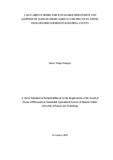Please use this identifier to cite or link to this item:
http://ir-library.mmust.ac.ke:8080/xmlui/handle/123456789/2511| Title: | A DATA-DRIVEN MODEL FOR SUSTAINABLE DEPLOYMENT AND ADOPTION OF CLIMATE SMART AGRICULTURE PRACTICES AMONG SMALLHOLDER FARMERS IN KAKAMEGA COUNTY |
| Authors: | Ndung'u, Simon Ndogo |
| Keywords: | DATA-DRIVEN MODEL SUSTAINABLE DEPLOYMENT AND ADOPTION CLIMATE SMART AGRICULTURE PRACTICES SMALLHOLDER FARMERS KAKAMEGA COUNTY |
| Issue Date: | Nov-2023 |
| Publisher: | MMUST |
| Abstract: | Kenya’s agriculture is dominated by 4.5 million smallholder farmers who produce over 75% of the national agricultural production. These farmers are the most vulnerable to climate change because of various socioeconomics, demography, and policy trends limiting their capacity to adapt to the change. To mitigate the negative effects of climate change on smallholder farmers, numerous interventions in the form of Climate Smart Agriculture (CSA) Technologies have been developed and promoted by various organizations. The current deployment of CSA practices, however, does not consider individual farm-level biophysical and socio-economic characteristics during the design and implementation of the interventions. This study, therefore, enhances smallholder farmers adaptation to climate change by development, prototyping and evaluating the suitability of a data-driven model for the sustainable deployment and adoption of CSA practices. Through a quantitative survey of 428 respondents, this study investigated the major socio-economic and biophysical characteristics of smallholder CSA farmers and developed a predictive tool for sustainable deployment of CSA practices. Supervised Machine Learning using the Scikit-Learn library of Python Programming language was used to build, pilot, and review Decision Tree and Random Forest Classifier models. The predictive tool was piloted among 15 smallholder CSA farmers and validated by key stakeholders in the CSA ecosystem through a Focus Group Discussion. While agroforestry, composting, and soil and water conservation structures were the most adopted, push-pull technology, conservation agriculture, and vermiculture were the least adopted CSA technologies. This study, further, established that smallholder farmers’ level of education, membership to a farmers’ group, interaction with extension officers and farming experience influenced adoption of CSA technologies. Factors that increase household productive resources, such as land ownership, household income, and access to agricultural credit also influenced adoption of CSA practices. The classifier model produced a Mean Squared Error of 0.16. The model predicted smallholder farmer adoption at an accuracy of 89.53% and 80.0% with test data and pilot data, respectively. Through the study, it was possible to predict which smallholder farmers would be CSA technology adopters using their farm specific characteristics. This study, therefore, develops a model for the optimal selection of Climate Smart Agriculture intervention beneficiaries. |
| URI: | http://ir-library.mmust.ac.ke:8080/xmlui/handle/123456789/2511 |
| Appears in Collections: | School of Agriculture, Veterinary Science and Technology |
Files in This Item:
| File | Description | Size | Format | |
|---|---|---|---|---|
| 23112023_Simon Ndungu Research Thesis_Final Thesis for Publishing.pdf | 3.12 MB | Adobe PDF |  View/Open |
Items in DSpace are protected by copyright, with all rights reserved, unless otherwise indicated.
